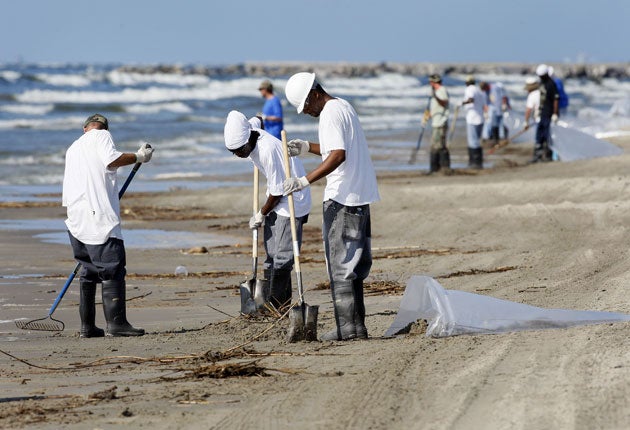The black hole at the bottom of the Gulf
No one seems to know the extent of the BP disaster

Some 33 days, nearly a billion dollars of expenditure, and umpteen official statements after the Deepwater Horizon oil rig blew up in the Gulf of Mexico – and the world is still none the wiser about how many millions of gallons of oil are leaking into the ocean every day, how much has already been discharged into the sea, and – more to the point – how this, maybe the world's worst oil disaster, can be stopped.
As scientists revise upward their guesstimates of the daily spill of crude into the sea (with some putting it as high as three million gallons a day), and BP halving its assessment of how much of the leak it is capturing, the attempts to deal with the disaster are, despite America's best efforts alongside one of the world's premier corporations, proving unequal to the task.
On Tuesday, BP engineers will attempt to plug the spewing well 5,000ft down on the ocean floor by spraying mud and cement into it. If that fails, there is a back-up plan which sounds about as hi-tech as throwing snowballs at the moon. It is called the "junk shot", and consists of trying to clog the well with golf balls, shredded tyres, and other refuse up to and including human hair. It has, more than a month after the calamity began, come to this.
And, with the frustration and impotence comes anger. President Obama raised the possibility of criminal prosecutions in his weekly radio address yesterday, saying: "First and foremost, what led to this disaster was a breakdown of responsibility on the part of BP and perhaps others, including Transocean and Halliburton."
Meanwhile, untold quantities of oil are creeping slowly ashore. Yesterday, sheets of rust-coloured heavy oil started to clog fragile marshlands on the fringes of the Mississippi Delta, damaging fishing grounds and wildlife. Brown and orange globs and sheets of foul-smelling oil the consistency of latex paint have also begun coating the reeds and grasses of Louisiana's wetlands, home to rare birds, mammals and a rich variety of marine life. A deep, stagnant ooze sat in the middle of a particularly devastated marsh off the Louisiana coast, where Emily Guidry Schatzel of the National Wildlife Federation was examining stained reeds. "This is just heartbreaking," she said. "I can't believe it." And on Grand Isle, Louisiana, officials closed the public beach, as thick gobs of oil resembling melted chocolate washed up.
BP, in charge of the cleanup, said that it will be at least Tuesday before engineers can shoot mud into the blown-out well. This has been tried on land, but never 5,000ft underwater. Crews will shoot the mud into a crippled piece of equipment atop the well. Then engineers will direct cement at the well to stop the oil permanently. BP executives say the only guaranteed solution to stop the leak is a pair of relief wells crews have already started drilling, but the work will not be complete until August.
As if BP weren't facing enough financial exposure, an exclusive report by a US news bureau yesterday warned that the Environmental Protection Agency (EPA) is considering banning the company from new government contracts, which could cost the oil giant billions in future revenues. Supplying the US army with oil is one of BP's biggest markets, and further exploration in the oil-rich Gulf of Mexico is part of its long-term strategy.
David Strahan, oil specialist and author of The Last Oil Shock, said yesterday: "If the US does ban BP from new contracts, this is serious bad news for it, as it could prompt other countries to boycott the company. The US is crucial to BP and the irony of the latest catastrophe is that it has happened in a safe country, whereas BP is used to battling it out in more dangerous countries like Russia and Iraq."
BP is already fighting to salvage its reputation after the oil spill which has seen its shares plunge as the daily cost of the rescue operation mounts. Around £27bn has been wiped off the value of the energy giant since the Gulf disaster, and BP estimates the daily cost is around £6m while independent analysts have put the total cost of the clean-up as high as $12bn.
A BP spokesman told The IoS yesterday that it had not received any information from the EPA with regard to a ban. But, privately, BP sources say that such a move, if it were to go ahead, would take years to put into effect and would cost millions in legal fees for all parties. EPA sources say it is unlikely to make any decision until after a full investigation into the Gulf oil spill – which could take at least a year. However, while the EPA is clearly anxious about BP's record in the US, it also acknowledges that BP is a big employer there and any ban could have its own unintended consequences.
Join our commenting forum
Join thought-provoking conversations, follow other Independent readers and see their replies
Comments